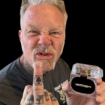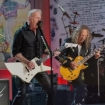"There was no precedent for Master of Puppets," says Kirk Hammett of Metallica's legendary third album. "So in the summer of 1985, when these songs were coming together, it was as if we were being visited by beings from another planet! That's what these songs felt like; they were so unique, and so individual — no one had ever heard anything like this before that. We kind of knew, once we got the group of songs together, that we had a pretty strong pile of material to record."
Recorded in Copenhagen, Denmark in the fall and early winter of 1985, and released in March 1986, Master of Puppets indeed marked a major step forward for Metallica, as well as thrash metal in general. The album's eight aggressive and complex tracks showed the band — vocalist/rhythm guitarist James Hetfield, drummer Lars Ulrich, bassist Cliff Burton and lead guitarist Hammett — truly firing on all cylinders, and reaching a new level of confidence and ability as musicians and songwriters. Master of Puppets spent 72 weeks on the Billboard 200 album charts, peaking at Number 29 and earning the band its first gold certification. It has since sold over six million copies in the U.S. alone, and still makes regular appearances near or at the top of "Best Metal Albums of All Time" lists.
But while any metalhead worth their denim and leather is already deeply familiar with Master of Puppets, the truly epic new Master of Puppets deluxe box set offers both a broader and more microscopic view of the landmark record. The limited-edition box includes 10 CDs, three vinyl LPs, two DVDs and a cassette containing demos, riff tracks, outtakes, rough mixes, interviews and live performances from 1985 through 1987, as well as remastered vinyl and digital versions of the original album. The box also includes a hardcover book containing never-before-published photos, a folder of handwritten lyrics, a set of six buttons and a "Damage, Inc." lithograph — but for hardcore Metallica obsessives, the real draw will be hearing how songs like "Battery," "Leper Messiah," "Welcome Home (Sanitarium)" and the title track slowly evolved from brief riffs to finished tracks.
On the eve of the box set's release, Revolver spoke to Hammett about the wealth of previously unreleased material in the collection, his memories of writing and recording Master of Puppets, and how a deviled ham sandwich was behind his glowering photo on the album's original back cover.
WHAT WERE SOME OF THE THINGS THAT IMMEDIATELY STRUCK YOU WHEN YOU DOVE BACK INTO THIS MATERIAL?
KIRK HAMMETT It's interesting, because we were kind of primed for all of this when we decided to work with Matt Taylor on the Master of Puppets book [Back to the Front: A Fully Authorized Visual History of the Master of Puppets Album and Tour]. When we decided to do that, it was like, "We'll do the reissue, and this book will be a great thing to coincide with it." And so we worked with Matt for a good eight or ten months, kind of recreating that time period from mid-1985 to mid-1986. And it was incredible, because by the time the book was done, Matt had broken it down to almost week-by-week, and that was an incredible primer for the old memory banks. [Laughs] So we were all kind of already in that Master of Puppets mode when the reissue started to come about.
But I can remember at one point there being a bit of a problem, because for the book we all went into our personal archives and dug out all those pictures and pieces of paper and notes and music and whatnot. And then, we kind of realized, "Wait — we have nothing left over for the reissue!" [Laughs] Matt Taylor's book did such a great job visually and anecdotally, that we kind of screwed ourselves with not having enough of that left over for the reissue. And then one day, an envelope arrived in the mail; I opened it up and there were a dozen pictures from the Master of Puppets tour — and the first thing I thought of was, "Okay, we need to save these for the reissue!" We were able to get enough stuff together to make it somewhat of a complete package, you know.
AND OBVIOUSLY, MATT COULDN'T PROVIDE THE MUSIC — AND THIS IS SUCH A TREASURE TROVE, FROM A MUSICAL STANDPOINT.
It's so ironic that the Fang track, "The Money Will Roll Right In," is finally being released. Yikes! [Laughs]
IRONIC, IN THE SENSE THAT IT'S BEING RELEASED AS PART OF A BIG-TICKET ITEM LIKE THIS?
Yeah, it's super-ironic. It was originally done by this band called Fang, from Berkeley; they put out three albums on Boner Records. The reason [our version] wasn't released in the first place was that it had none of the punk-rock charm when we recorded it; it was too slick, and it was a bit overplayed — I mean, Cliff and I don't even play on it, and it's a bit overplayed. [Laughs] It was just something that we tried and thought, "You know …" It doesn't have that raunchiness and that humor that the original had.
SO THAT'S JUST JAMES AND LARS PLAYING ON THE TRACK?
I believe so, but I can't remember. Cliff might have been on it, but I am certainly not on it.
ASIDE FROM FANG, WHAT OTHER THINGS WERE YOU LISTENING TO WHEN YOU WERE WRITING THE ALBUM?
We were listening to a lot of the Misfits, a lot of Discharge, GBH. Cliff was listening to a lot of Velvet Underground, Lynyrd Skynyrd, Bach and Stevie Ray Vaughan. He was really into Stevie when Stevie first showed up — he thought Stevie was a great player. I was listening to all that stuff, plus all the stuff I usually listened to, all the German bands that I liked and Seventies hard rock, and the New Wave of British Heavy Metal. All those NWOBHM bands were falling by the wayside at that point; all the ones who were actually going to have a career, like Def Leppard, Saxon and Iron Maiden, were already on their way. So, it would have been a combination of a lot of that stuff back then. Oh yeah — and a lot of Kate Bush, too!
REALLY?
Oh, yeah; we'd discovered Kate Bush around that time. And we loved the Police — we listened to the Police all the time, because Cliff was a big fan of Stewart Copeland's drumming, and he loved the sound of his snare. He'd say, "Oh, I love that snare!" [Laughs]
SPEAKING OF NWOBHM, YOU CAN REALLY HEAR THE NWOBHM INFLUENCE IN THE JUNE 1985 DEMO OF "MASTER OF PUPPETS" — ESPECIALLY IN JAMES' VOCALS, WHICH ARE HIGHER AND SMOOTHER THAN ON THE ALBUM VERSION.
At that point, I think James was still kind of settling into a vocal style. His vocal style changed drastically around the time of …And Justice for All and The Black Album; his singing changed dramatically. I think his technique and his style was still developing at that point, or he hadn't fully found it yet, so that's why there's a difference there.
WHAT ABOUT YOUR OWN TECHNIQUE AS A GUITAR PLAYER — IN RETROSPECT, WHERE WERE YOU AT THAT POINT?
For me, I was just totally into Ulrich Roth at that point. I remember having the Fire Wind album, and listening to it day in and day out, and loving it tremendously. One really frustrating thing that I can remember about the recording of Master of Puppets was that it took me three friggin' days to get a lead tone. It hasn't taken me that long since! Usually it takes me, at the most, maybe eight to ten hours. On Hardwired to Self-Destruct, I think we spent all of maybe ninety minutes on my lead sound, and then we used that sound as a jumping point for other lead sounds. But back then, in 1985, we had our new Mesa Boogie amps, and we were still kind of finding the sweet spot. [Master of Puppets producer] Flemming Rasmussen put me in a room, and he'd say, "Turn knobs!" I'd bring in a bunch of amps the first day, and we couldn't find anything. The second day, I'd bring in a bunch of different amps, and it'd be, "Turn knobs!" Couldn't find anything. And then the third day, I said, "All those other amps didn't even come close. I'm just gonna go back to my Mesa Boogie." And then I got the tone; I turned a corner, and I got the sound. But it was kind of a learning experience for me.
That's one of the things that sticks out [from the recording sessions], other than playing a lot of poker with Cliff Burton. Just waiting for our turns to record, so we would literally sit there and play poker for five or six hours. And we wouldn't play for money — we would play for matchsticks.

WHO WAS THE BETTER POKER PLAYER — YOU OR CLIFF?
Him and I were always intensely competitive. Two guys in their early twenties? Come on – we were always competing. But it would be really funny, ridiculous competing; it would always be, Who's the better poker player? Who's the better chess player? Who can eat spicier hot sauce?
One time we had a disagreement where he wanted Chinese food and I wanted something else, and he said, "I think we should settle this by fisticuffs." I didn't even know what he was talking about — he had to explain to me what "fisticuffs" was! [Laughs] I said, "I have to play tonight, you have to play tonight. I'm not gonna do that!" And then he goes, "Okay, let's just go out and tackle each other!" So we went out into the back area and just started tackling and wrestling with each other. It was hilarious. And the funny thing was, both of us were always totally up for it. Neither of us ever said, "Oh, look at us, we're acting like kids. This is dumb!" [Laughs] We were always up for it, and that was a funny thing between Cliff and I.
WELL, YOU WERE STILL KIND OF KIDS AT THE TIME. YOU WERE, WHAT, 23 WHEN YOU WERE MAKING THIS RECORD?
Yep, absolutely. I was 23 years old. But you know, I gotta say, Master of Puppets is my favorite album, because we culminated as a band on Master of Puppets. Really! Everyone was kind of settled into their roles; everyone was playing well. We knew what we were striving for, we knew what we could do, we knew each other's playing well, we knew our strengths. And it just kind of all culminated on this album.
IT'S KIND OF LIKE WHEN YOU WERE TALKING ABOUT FINDING THE SWEET SPOT ON THE AMP — THIS RECORD WAS ABOUT FINDING YOUR SWEET SPOT AS A BAND.
Yeah. And we never got to that point again, sad to say, because Cliff left us. And that's another reason why Master of Puppets is so special to me — it's the culmination of that lineup, it's the culmination of us as a band. We were defining our sound while we were still fucking developing it, you know?
For instance, the bass solo in "Orion" — there's the long, melodic, drawn-out harmony part, and then there's a guitar solo, and then there's a bass solo, and another one later on in the song. That second bass solo was originally a guitar solo. I remember recording it in the studio, and then I left to go back to the East Coast and meet a girl or something, I don't know. Cliff went back to the studio, and used that area to put his own solo on it — but he played like half of my licks that were in the original solo! [Laughs] It was the weirdest thing! I remember hearing it for the first time and going, "Wha? What's going on here? That was the second guitar solo in that part!" And he goes, "Yeah … but I figured I had something really good to play there." And I said to him, "Yeah, the first part — but the second part of it was like my solo, and you just played it on bass!" And he goes, "Yeah … I know. Is it cool?" And I said, "Yeah, it's cool — it sounds great!" It wasn't really much of an issue for me, because there were like four guitar solos in that song; it wasn't like he took the only one.
IS THERE ANYTHING ON THE BOX SET THAT SURPRISED OR SHOCKED YOU — LIKE, WHERE YOU HAD ABSOLUTELY NO MEMORY OF RECORDING IT?
Well, I was kind of amazed at how developed the guitar solos were [on the demos]. A lot of them were developed quite a bit, and I just don't remember doing that much preparation beforehand. As you know — or maybe you don't know — my whole thing now is stream of consciousness spontaneity, a "capture the moment" kind of thing. So that in itself is kind of surprising to go back and hear; it's like it chronicled my own growth.
ARE THERE ANY OTHER LESSER-KNOWN TIDBITS ABOUT MASTER OF PUPPETS THAT YOU'D CARE TO SHARE WITH US?
The back cover shot of me, where I'm giving a dirty look to the camera? That was because, I had just become a vegetarian back then, and we were at the Donnington Festival; someone threw a deviled ham sandwich from the audience, and it fucking smashed right on my brand new black Jackson Flying V. And I was so fucking pissed! [Laughs] I looked over to the side, and I saw my guitar tech laughing, and I saw [photographer] Ross Halfin laughing, and I just gave them a dirty look, and then Ross took the shot. And that's the shot that's on the back of Master of Puppets!
I'VE SEEN THAT PHOTO A MILLION TIMES, AND NEVER HAD ANY IDEA THAT A DEVILED HAM SANDWICH WAS PART OF THE EQUATION.
Yeah. I didn't even know they had deviled ham in Britain — I thought it was an American thing!
OVER THREE DECADES ON, HOW DOES THE ALBUM STAND UP FOR YOU?
When this album came out, it had no real precedent; and now, thirty years later, there are a lot of albums out there that have a similar sound. But if we were to come out with this album now, it would sound current, it would sound contemporary, it would sound new. It would fit well in the contemporary music world, I think. It might not have the same impact, but people would still recognize it for what it is.












